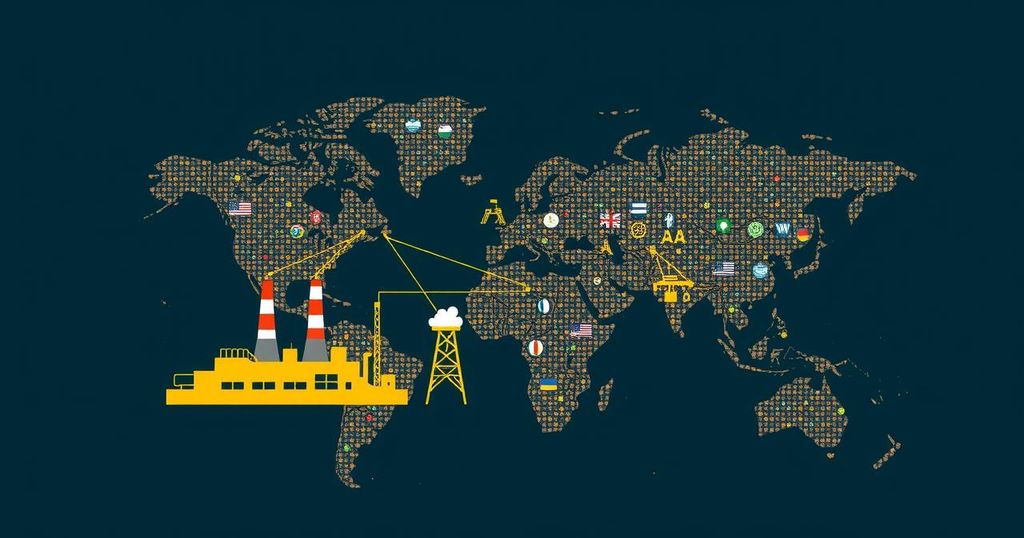COP29 in Baku, Azerbaijan, highlighted the fossil fuel industry’s overwhelming influence with over 1,770 lobbyists present, raising concerns over their impact on critical climate discussions. Their strategies include numerical intimidation, securing high-level access, and evading financial responsibilities, further complicating global climate finance efforts. These tactics threaten to detract from essential policy reforms needed to support vulnerable populations facing the brunt of climate impacts.
The fossil fuel industry’s involvement in the recent UN climate negotiations, COP29, held in Baku, Azerbaijan, illustrates a concerning trend characterized by overwhelming representation and influence over the proceedings. More than 1,770 lobbyists from various oil and gas companies, far surpassing most national delegations, have been allowed entry, signaling a serious potential for undermining the voices of marginalized groups, particularly from the Global South. This heavy presence poses direct challenges to the objectives of increasing climate finance and promoting a swift transition from fossil fuel dependence. This year’s Summit saw a multifaceted approach by fossil fuel entities to reshape climate discussions, through strategies such as demonstrating numerical strength, gaining high-level access to influential decision-makers, and evading financial accountability. Despite significant environmental responsibilities, leading fossil fuel companies continue to receive substantial subsidies while simultaneously invoking the need for governmental incentives to shift towards greener technologies. It is crucial for policymakers to recognize and counter these tactics that hinder essential climate action. Moreover, instances of greenwashing and superficial public relations efforts abound at COP29, wherein lobbyists present themselves as advocates for climate solutions while pushing misleading narratives that fuel continued fossil fuel reliance. For example, numerous corporate pamphlets and messaging highlight gas as a cleaner alternative, obscuring the fact that it still contributes significantly to global warming. Such tactics divert attention from urgent policy reforms necessary to curb climate change and support developing nations disproportionately affected by its consequences. Stakeholders involved in climate policy must not permit fossil fuel representatives to dictate terms or gain disproportionate influence in negotiations. A prime example is the recent escalated push for financial resources aimed at addressing climate loss and damage, following a backdrop of record-high profits reported by fossil fuel corporations amidst ongoing climate disasters, which continue to devastate lower-income countries. In shifting focus back to those most affected by climate change, the international community must prioritize substantive and equitable climate finance mechanisms rather than allowing fossil fuel interests to undermine critical efforts.
The involvement of the fossil fuel industry in UN climate negotiations has increasingly raised alarms regarding the integrity and direction of climate policy discussions. COP29 in Baku has showcased how the industry exploits its full membership strength to exert influence over negotiations, sidelining crucial considerations for vulnerable populations and reinforcing systemic obstacles to achieving climate equity. Recognizing the detrimental effects of fossil fuel exploitation and mobilization at international climate forums is imperative to ensure equitable actions towards climate justice and sustainable energy solutions. As fossil fuel corporations amass considerable financial gains and exert vast influence, the disparity in their responsibilities compared to less financially endowed nations continues to grow, further complicating the dialogue on climate finance and transition strategies.
In summary, the fossil fuel industry’s profound influence over COP29 reveals critical challenges in maintaining the integrity of international climate negotiations. This overwhelming representation underscores the necessity for governments and decision-makers to act decisively against tactics designed to co-opt and undermine climate action. It is essential to prioritize the voices of the vulnerable and to ensure equitable climate finance, facilitating a just transition to sustainable energy solutions that genuinely address the climate crisis.
Original Source: blog.ucsusa.org






